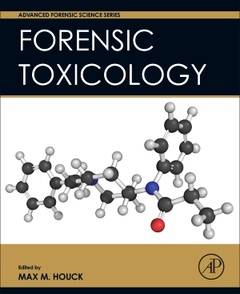Description
Forensic Toxicology
Advanced Forensic Science Series
Coordinator: Houck Max M.
Language: English
Subjects for Forensic Toxicology:
Support: Print on demand
Description
/li>Contents
/li>Biography
/li>Comment
/li>
Forensic Toxicology, the latest release in the Advanced Forensic Science Series that grew out of recommendations from the 2009 NAS Report, Strengthening Forensic Science: A Path Forward will serve as a graduate level text for those studying and teaching forensic toxicology. It is also an excellent reference for the forensic practitioner?s library or for use in their casework. Coverage includes a wide variety of methods used, along with pharmacology and drugs and professional issues they may encounter. Edited by a world-renowned, leading forensic expert, this updated edition is a long overdue solution for the forensic science community.
[All sections will include Review questions, Discussion questions and Additional reading section]
Section 1. Introduction Principles of Forensic Sciences Forensic Classification of Evidence Interpretation/The Comparative Method Toxicology: History Toxicology: Overview and Applications
Section 2. Methods Capillary Electrophoresis: Basic Principles Capillary Electrophoresis in Forensic Chemistry Chromatography: Basic Principles Liquid and Thin-Layer Chromatography Liquid Chromatography-Mass Spectrometry Gas Chromatography-Mass Spectrometry Nonchromatographic Separation Techniques Spectroscopic Techniques Spectroscopy: Basic Principles
Section 3. Pharmacology and Drugs Analysis of Controlled Substances Classification Designer Drugs Pharmacology and Mechanism of Action of Drugs Volatile Substances and Inhalants Alcohol Congeners and the Source of Ethanol Herbal psychoactive substances Herbal Medicines and Phytopharmaceuticals – contamination
Section 4. Matrices Blood Urine and Other Body Fluids Blood Breath Alcohol Metabolites of Ethanol Oral Fluid Drugs in Hair Postmortem Blood Urine Postmortem Specimens Behavioral Toxicology Stomach Contents Analysis
Section 5. Interpretation Measurement Uncertainty Postmortem Toxicology: Artifacts Interpretation of Results Methods of Analysis-Initial Testing Methods of Analysis-Confirmatory Testing Chemometrics Interpretation
Section 6. Professional Issues From Crime Scene to Court Forensic Laboratory Reports Health and Safety Postmortem Specimens Drug Facilitated Crimes Drug-Impaired Driving Drug Screening in Sport
Widely published, Houck has dozens of peer-reviewed journal articles and is the author and editor of numerous books. He is co-author of the best-selling Fundamentals of Forensic Science, Science of Crime Scenes, and Success with Expert Testimony, among others. He is the editor of the Advanced Forensic Science series of books. Houck is also founding co-editor of Forensic Science Policy and Management (the official journal of ASCLD), the only journal that addresses the management, policy, and administration of forensic science.
Houck has served on numerous committees, including for the National Academies of Science, NIST, Interpol, The Royal Society, the Director of the FBI, and the White House. He is a popular public speaker and has given presentations at NASA, the Max Planck Institute, an Oxford Roundtable, as well as keynote talks at numerous international conferences. Houck has taught at several universities, including West Virginia University and University of Tampa. His research topics include management, leadership, and policy implications for forensic organizations.
Houck has a Bachelors and Masters degree in anthropology from Michigan State University. He received his Ph.D. in Applie
- Provides basic principles of forensic science and an overview of forensic toxicology
- Contains information on a wide variety of methods
- Covers pharmacology and drugs, matrices and interpretation
- Includes a section on professional issues, such as crime scene to court, lab reports, health and safety, post-mortem and drug facilitated crimes
- Incorporates effective pedagogy, key terms, review questions, discussion questions and additional reading suggestions
These books may interest you

Forensic Anthropology 85.01 €

Forensic Fingerprints 68.41 €

Forensic Engineering 102.64 €

